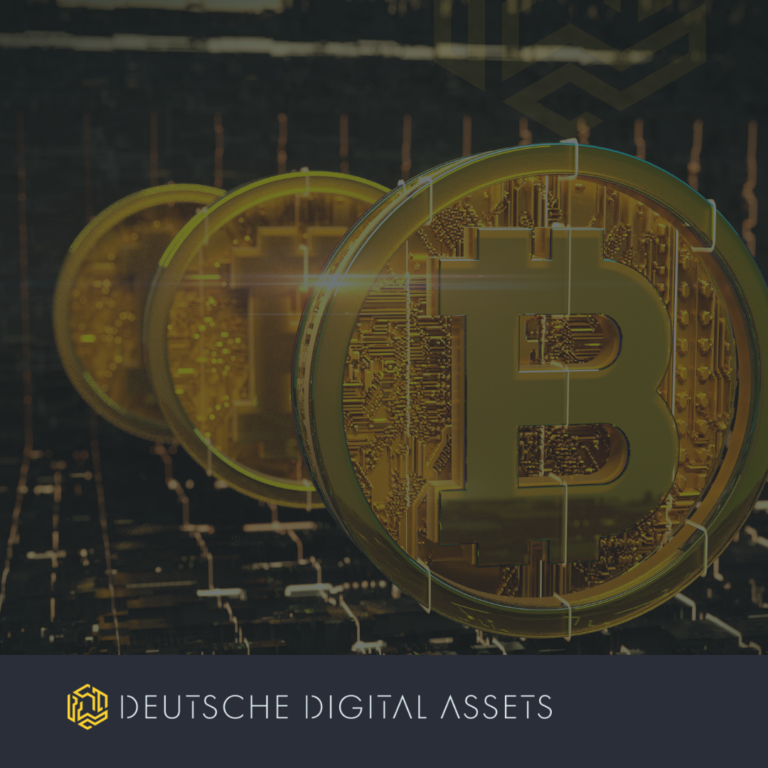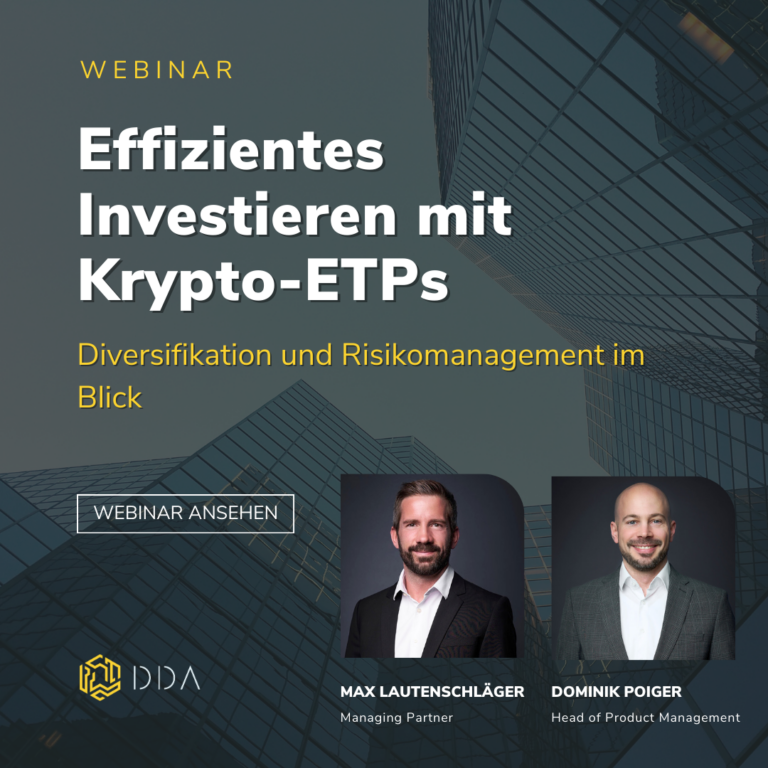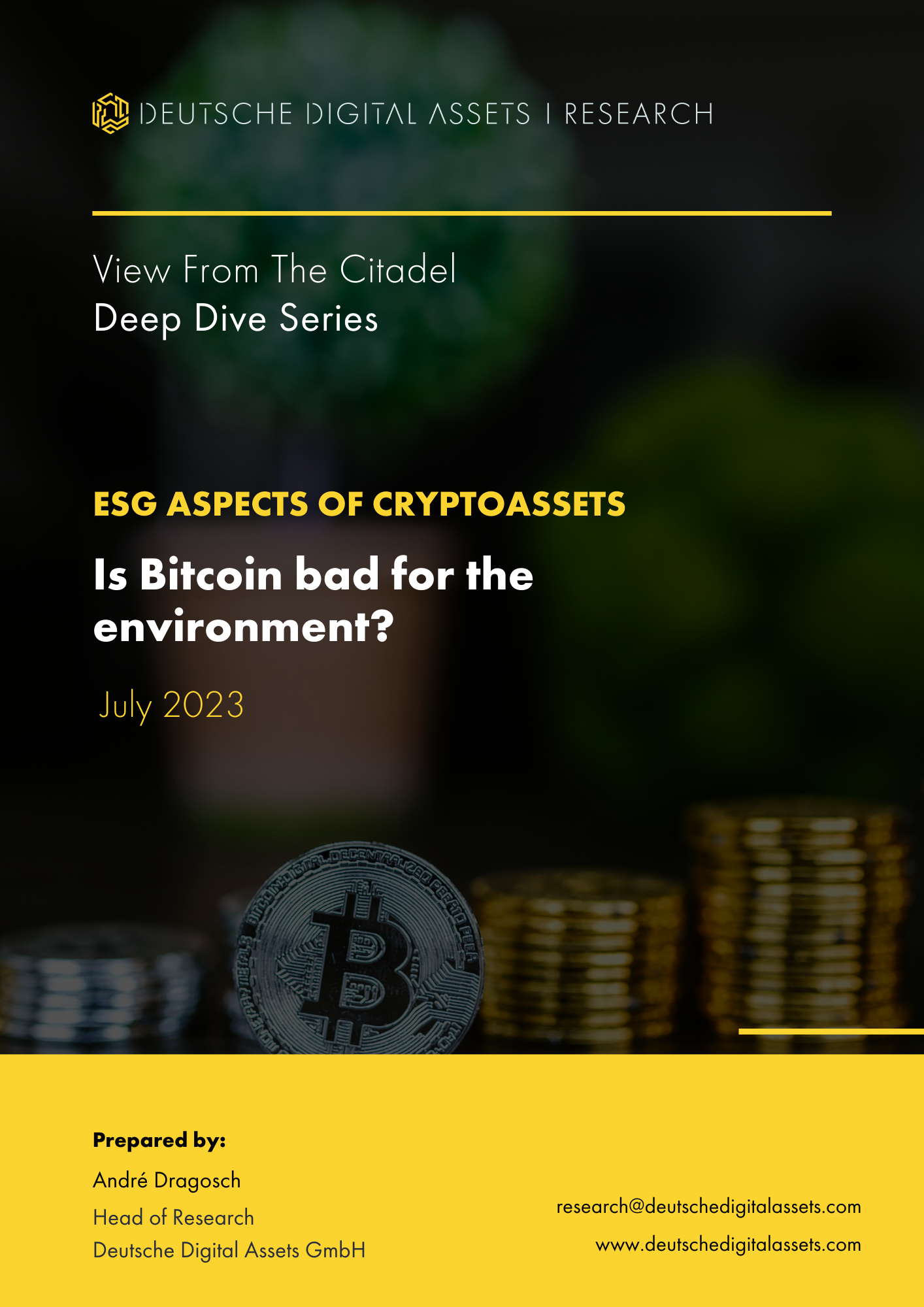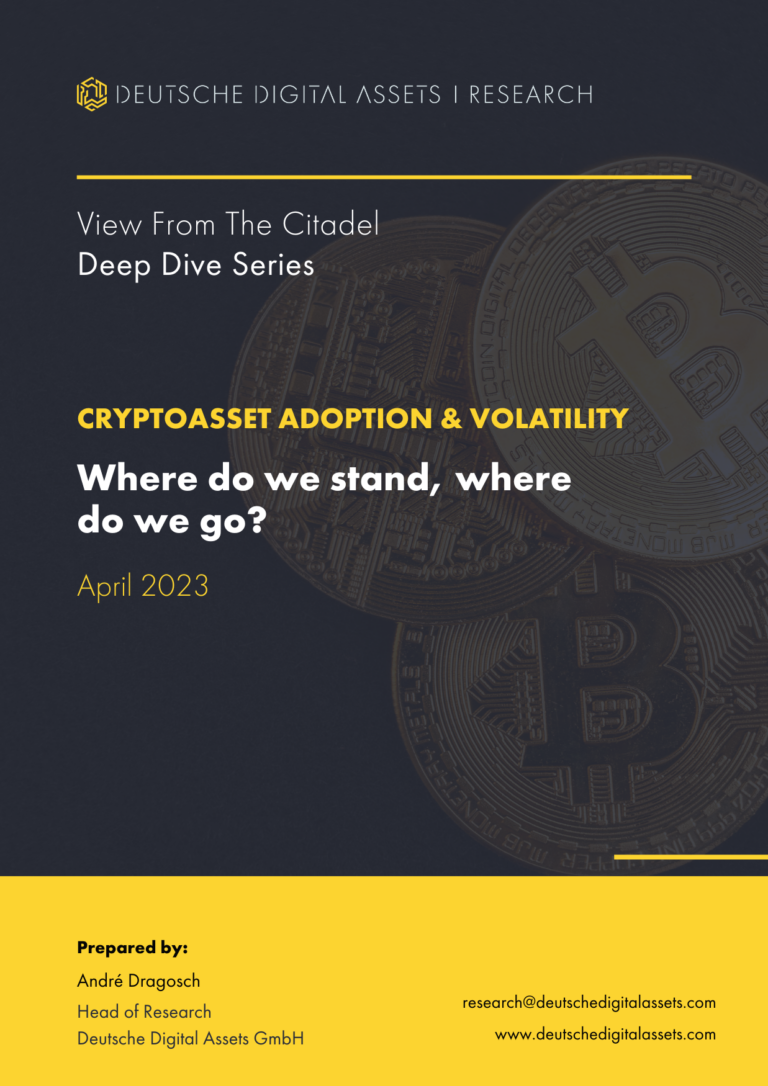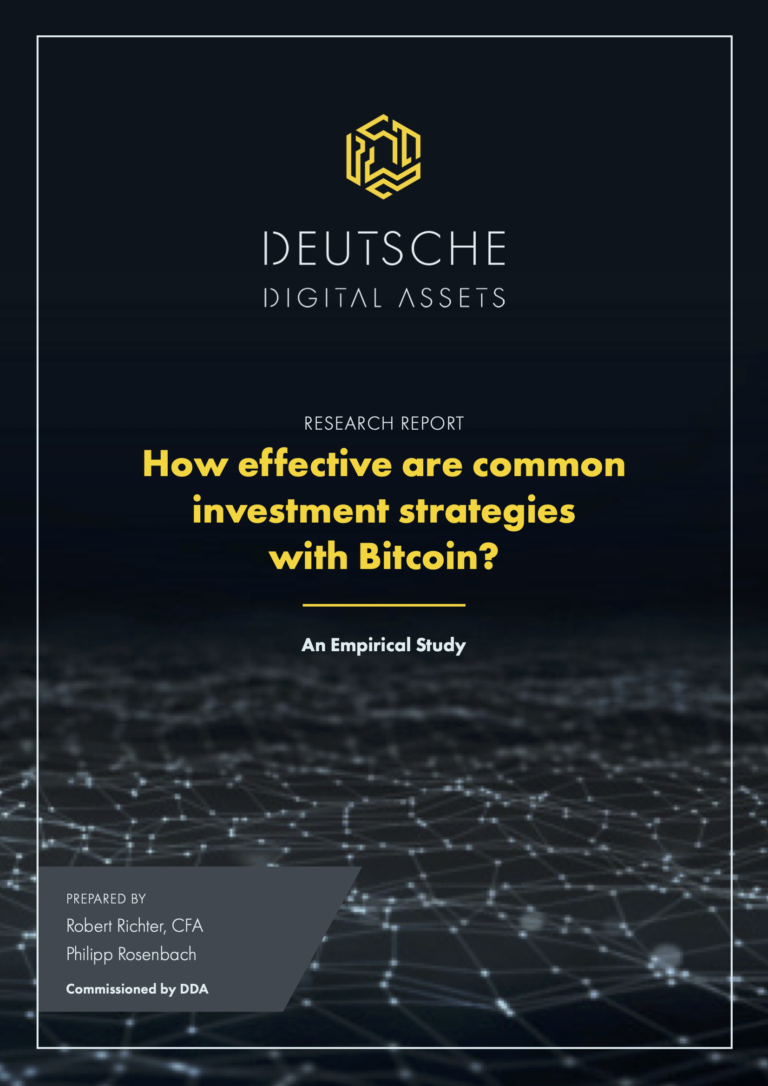
Heute ist es für Institutionen einfacher als je zuvor, in Bitcoin zu investieren. Dank eines freundlicheren regulatorischen Umfelds in Kombination mit börsennotierten Bitcoin-Investmentprodukten ist der Zugang zu Bitcoin für traditionelle Investoren einfacher als je zuvor. All dies wurde durch die Institutionalisierung von Bitcoin als Anlageklasse ermöglicht, die sich nun eines breiten Ökosystems rühmen kann, das aus regulierten Börsen, liquiden Derivatemärkten, qualifizierten Verwahrern, börsennotierten Bitcoin-Unternehmen und sogar einem Bitcoin-ETF besteht. Lassen Sie uns eintauchen und erkunden, wie weit wir mit der Institutionalisierung von Bitcoin sind und was das für Krypto-Investoren in Zukunft bedeuten wird.
Was ist die Institutionalisierung von Bitcoin?
KPMG definiert die Institutionalisierung von Krypto-Vermögenswerten als "die Beteiligung traditioneller und aufstrebender Akteure innerhalb des globalen Finanzdienstleistungsökosystems in großem Maßstab", zu dem Investmentbanken, Broker-Dealer, Anlageverwaltungsgesellschaften und Zahlungsanbieter gehören.
Kurz gesagt bedeutet die Institutionalisierung von Bitcoin, dass sich die digitale Währung von einer spannenden Anlage, die in erster Linie Kleinanlegern vorbehalten ist, zu einer institutionellen Anlageklasse entwickelt, die mit Aktien, Anleihen und Rohstoffen gleichgestellt ist.
Während das Bitcoin-Handelsökosystem weiter reift und mit den traditionellen Finanzmärkten verschmilzt, ist die Institutionalisierung von Bitcoin in vollem Gange.
Vor einigen Jahren investierten die meisten institutionellen Anleger nur über Derivate wie die CME Bitcoin Futures und Investmentvehikel wie den Grayscale Bitcoin Trust oder den Galaxy Digital Bitcoin Fund LP in Bitcoin.
Dank der fortschreitenden Institutionalisierung der Kryptomärkte haben institutionelle Anleger heute jedoch ein viel breiteres Spektrum an Möglichkeiten, in Bitcoin zu investieren. Mit dem Aufkommen qualifizierter Krypto-Verwahrstellen können institutionelle Anleger sogar direkt in Bitcoin investieren und sie bei einer Verwahrstelle lagern.
Mit der Kombination aus einem ausgereiften Bitcoin-Handelsökosystem und den beeindruckenden historischen Renditen von Bitcoin ist es keine Überraschung, dass die Wall Street auf Kryptowährungen setzt.
Die Wall Street wird kryptografisch
Am 19. Oktober 2021 wird der erste US-amerikanische Bitcoin-ETF an der New Yorker Börse notiert. Unnötig zu sagen, dass die Notierung des ersten Bitcoin-ETF an der größten Börse der Welt eine große Sache ist.
Dies bestätigt nicht nur den wachsenden Appetit der Wall Street auf Kryptowährungen und die Bereitschaft der US-Regulierungsbehörden, Bitcoin (endlich) als Anlageklasse zu akzeptieren, sondern hat auch das Potenzial, eine Welle neuer Gelder (sowohl von Institutionen als auch von Privatpersonen) in Bitcoin anzuziehen.
Es wird erwartet, dass weitere auf Bitcoin-Futures basierende ETFs auf den Markt kommen werden, nachdem die SEC grünes Licht für Bitcoin-Futures-ETFs gegeben hat.
Aber es sind nicht nur Investmentmanager, die sich aktiv mit der starken Nachfrage nach Bitcoin auseinandersetzen. Trotz ihrer Vergangenheit als Bitcoin-Gegner tauchen nun auch US-Investmentbanken kopfüber in Kryptowährungen ein.
- Morgan Stanely war die erste US-Bank, die ihre Vermögensverwaltungskunden im ersten Quartal 2021 in Bitcoin-Fonds investierte.
- Die Bank of America hat vor kurzem die Deckung von Krypto-Assets eingeführt und behauptet, der Markt sei "zu groß, um ihn zu ignorieren".
- JPMorgan hat im Frühsommer 2021 damit begonnen, seinen Vermögensverwaltungskunden Unterstützung für Kryptowährungsfonds anzubieten.
Und sie sind nicht die Einzigen. Goldman Sachs, Citi, Wells Fargo und mehrere andere Wall-Street-Bankriesen bauen Krypto-Teams auf und arbeiten an der Einführung von Krypto-Produkten, um der Kundennachfrage gerecht zu werden.
Die Nachfrage nach Bitcoin-Produkten im traditionellen Finanzwesen steigt, und die Investmentbanken zögern nicht länger, diesen wachsenden Bedarf zu decken. Banken, die sich noch nicht mit Kryptowährungen beschäftigt haben, müssen sicherstellen, dass sie nicht zurückbleiben.
Was bedeutet die Institutionalisierung von Bitcoin für Krypto-Investoren?
Wenn institutionelle Investoren und börsennotierte Unternehmen Geld in Bitcoin investieren, führt dies in der Regel zu einem Anstieg des Marktwerts von Bitcoin.
"Institutionelle Investitionen in Bitcoin wurden lange Zeit als unabdingbar angesehen, um eine Marktkapitalisierung von mehreren Billionen Dollar zu erreichen", schrieb Arcane Research in ein Bericht. Dies war während der Hausse in Q1/2021 zu beobachten, als die Marktkapitalisierung von Bitcoin die Marke von $1 Billion überschritt. Der Kauf der digitalen Währung durch Staatsanleihen von Unternehmen und institutionellen Anlegern war eine wichtige Triebfeder für diese Rallye.
Die Reifung des Bitcoin-Handelsökosystems wird auch eine höhere Liquidität und höchstwahrscheinlich mehr Preisstabilität bedeuten. Während wir immer noch steile Preiskorrekturen erwarten können, wie wir sie in der Vergangenheit gesehen haben, hat die tägliche Volatilität von Bitcoin mit der Zeit abgenommen. Dieser Trend wird sich wahrscheinlich fortsetzen, wenn Bitcoin in größerem Umfang gehandelt wird.
Bei abnehmender Intraday-Volatilität können wir davon ausgehen, dass mehr Anleger in Scharen zu Bitcoin strömen werden, da er schließlich nicht mehr als risikoreiche Anlage eingestuft wird. Dies wiederum könnte auch dazu beitragen, den Preis des digitalen Goldes weiter nach oben zu treiben.
Die Institutionalisierung von Bitcoin trägt auch dazu bei, die Meinung der wenigen verbliebenen Bitcoin-Skeptiker zu ändern, da es immer schwieriger wird, gegen die Gültigkeit eines Vermögenswerts zu argumentieren, der jetzt (wenn auch über einen ETF) an der New Yorker Börse gehandelt wird.
In der Bitcoin-Hausse von 2017 gab es immer noch eine Menge Leute, die behaupteten, dass der Wert von Bitcoin auf Null sinken würde, sobald die Blase platzt. Dieser Bullenmarkt ging zwar zu Ende und der Bitcoin-Kurs fiel deutlich, doch drei Jahre später erreichte die digitale Währung ein neues Allzeithoch und brachte viele ihrer Kritiker zum Schweigen.
Die Institutionalisierung von Bitcoin hat dazu beigetragen, dass mehr Geld in Bitcoin fließt und damit der Wert des digitalen Goldes steigt.
Deshalb begrüßen - trotz des Anti-Wall-Street-Ethos von Bitcoin - viele Bitcoiner die Institutionalisierung von Bitcoin. Je mehr Geld in Bitcoin fließt, desto mehr Mittel stehen für Bitcoin-Startups und Befürworter zur Verfügung, um ihre Missionen erfolgreich zu erfüllen.
Wenn ein Fondsmanager in New York Bitcoin über einen Bitcoin-ETF kauft, trägt das nicht dazu bei, die zwei Milliarden Menschen ohne Bankverbindung auf der ganzen Welt zu versorgen. Es könnte jedoch dazu beitragen, den Preis von Bitcoin zu erhöhen, was wiederum Bitcoin-Unternehmen, die Produkte und Dienstleistungen entwickeln, die darauf abzielen, Bankgeschäfte mit den Unbanked zu machen, in die Lage versetzt, schneller zu wachsen, da ihre Bitcoin-Bestände an Wert gewinnen werden.
Die Akzeptanz von Bitcoin als Anlageklasse wird wahrscheinlich zu einer weiteren Verbreitung führen, nicht nur als Anlage, sondern auch als Währung. Mit immer mehr Menschen, die Bitcoin halten, und einem Rückgang innerhalb eines Tages wird Bitcoin eine bessere Chance haben, schließlich ein weit verbreitetes Tauschmittel zu werden. Das ist im Grunde das, was viele von uns Bitcoinern gerne sehen würden.
Ironischerweise könnten es am Ende die Leute an der Wall Street sein, die dazu beitragen, dass Bitcoin zu der globalen Währung wird, die sich viele von uns vorstellen.
Abschließende Überlegungen
Während die Institutionalisierung von Bitcoin ein bisschen wie ein Oxymoron klingen mag, wenn man Cypherpunk-Werte vertritt, würde man gerne sehen, wie "Bitcoin die Banken frisst", aber die Realität ist, dass institutionelle Investoren, die sich in Bitcoin stürzen, höchstwahrscheinlich positiv für Bitcoin, die Bitcoin-Gemeinschaft und die Welt sind.
Je mehr Geld in Bitcoin fließt, desto mehr Geld hat die Bitcoin-Gemeinschaft, um die Veränderungen zu erreichen, die sie in der Welt sehen möchte.
Über DDA Ikonische Fonds
Iconic Funds ist die Brücke zum passiven und aktiv verwalteten Engagement in Kryptowährungen. Iconic Funds bietet über seine Tochtergesellschaften Krypto-Asset-ETPs, diversifizierte Indexfonds und Alpha-Strategien für Anleger an.
Iconic Funds hat es sich zur Aufgabe gemacht, die Akzeptanz von Krypto-Assets zu fördern. Als Brücke für Anleger, die in Krypto-Assets investieren wollen, bieten die lizenzierten und regulierten Vehikel von Iconic den Anlegern eine Auswahl an Anlagemöglichkeiten, die von passiven Indexanlagen bis hin zu aktiv verwalteten Strategien reichen. Iconic Funds beseitigt die technischen Risiken von Krypto-Investitionen, indem es Anlegern vertrauenswürdige und vertraute Mittel zur Investition in Krypto zu branchenführend niedrigen Kosten bietet.
Durch die Verbindung von modernster Technologie, innovativen Anlageprodukten und kompromissloser Professionalität steht Iconic an der Spitze der Krypto-Vermögensverwaltung.
- Analyse der wichtigsten Werttreiber der führenden Kryptowährungen ➡ Hier herunterladen
- Wie effektiv sind gängige Anlagestrategien mit Bitcoin? ➡ Hier herunterladen
- Untersuchung des Mythos der Nullkorrelation zwischen Kryptowährungen und Marktindizes ➡ Hier herunterladen
Weitere Informationen finden Sie unter deutschedastg
Haftungsausschluss
In keinem Fall können Sie die ICONIC HOLDING GMBH, ihre Tochtergesellschaften oder eine mit ihr verbundene Partei für direkte oder indirekte Anlageverluste haftbar machen, die durch Informationen in diesem Artikel verursacht wurden. Dieser Artikel ist weder eine Anlageberatung noch eine Empfehlung oder Aufforderung zum Kauf von Wertpapieren.
Die ICONIC HOLDING GMBH ist in keiner Rechtsordnung als Anlageberater registriert. Sie erklären sich damit einverstanden, Ihre eigenen Nachforschungen anzustellen und Ihre Sorgfaltspflicht zu erfüllen, bevor Sie eine Investitionsentscheidung in Bezug auf die hier besprochenen Wertpapiere oder Investitionsmöglichkeiten treffen.
Unsere Artikel und Berichte enthalten zukunftsgerichtete Aussagen, Schätzungen, Prognosen und Meinungen, die sich als wesentlich ungenau erweisen können und von Natur aus erheblichen Risiken und Unsicherheiten unterliegen, die außerhalb der Kontrolle der ICONIC HOLDING GMBH liegen. Unsere Artikel und Berichte drücken unsere Meinungen aus, die wir auf der Grundlage allgemein verfügbarer Informationen, Feldforschung, Schlussfolgerungen und Ableitungen durch unsere Due Diligence und unseren analytischen Prozess gewonnen haben.
Die ICONIC HOLDING GMBH geht davon aus, dass alle hierin enthaltenen Informationen korrekt und zuverlässig sind und aus öffentlichen Quellen stammen, die wir für korrekt und zuverlässig halten. Diese Informationen werden jedoch "wie besehen", ohne jegliche Garantie, präsentiert.







